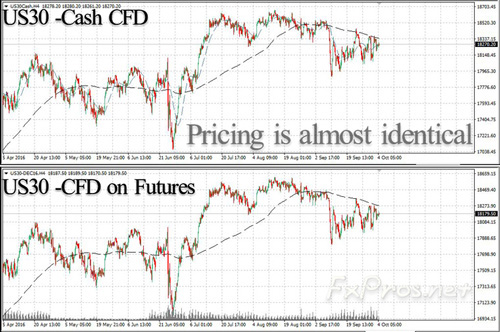
A Futures contract gives its holder the right to buy (or sell) a predetermined quantity of a commodity at a set price on a specified date in the future.
Originally, Futures contracts covered physical commodities like grain, cotton, and coffee. Today, however, they encompass many more asset classes, including currencies, bonds, and stock market indices.
Trading CFDs on Futures
Instead of trading Futures contracts directly, you can trade CFDs on Futures. Futures trading allows investors to speculate on the price movement of financial instruments, whether up or down. It is also used by commodity suppliers to hedge against market risk. This combination of speculation and hedging creates significant market volume and price volatility. CFDs enable investors to speculate on these price movements with certain advantages.
What are Futures Contracts?
A Futures contract is a standardized exchange-traded agreement that can be used to trade any financial market, both upwards and downwards. Futures contracts can be transferred and traded between parties other than the original counterparties.
Futures Contracts History
The first standardized exchange-traded forward contract was introduced by the Chicago Board of Trade (CBOT) in 1864, initially based on grain.
In 1972, the International Monetary Market (IMM) became the world’s first financial Futures exchange, launching currency futures. In 1976, IMM introduced US Treasury bill interest rate futures, and in 1982, it added stock market index futures.
Advantages of CFDs on Futures
Trading Futures via CFDs offers greater flexibility compared to direct Futures trading:
-
CFDs closely mirror the price movements of Futures contracts with tight spreads and no commissions.
-
Futures contract holders are obligated to fulfill contract terms, whereas CFD holders only need to meet margin requirements.
-
Opening a CFD account online is easier and faster than opening a Futures trading account.
-
CFD accounts can be opened with as little as $50 and funded through various methods, including PayPal, Skrill, and Neteller.
-
CFDs allow automated trading strategies using Expert Advisors.
-
CFDs on Futures can be traded on MetaTrader 4, including mobile platforms.
-
CFDs on Futures do not incur overnight financing fees (SWAPs), unlike common Cash CFDs—especially beneficial when trading indices or commodities.
Chart: (US30) Pricing between common Cash CFDs and CFDs on Futures is nearly identical

Key Trading Conditions
Trading Costs of CFDs on Futures
Trading CFDs on Futures involves costs limited to the price spread, as no commissions are charged. The spread is the difference between the bid (buying) and ask (selling) prices, simplifying cost management for traders. Additionally, CFDs on Futures do not have overnight financing fees (SWAPs), a significant advantage when trading indices or commodities.
-
No trading commissions
-
No overnight financing (SWAPs)
-
Pay only the spread
Mechanics of CFDs on Index Futures
When trading CFDs on Futures, two factors are crucial:
-
The market direction you choose (long or short)
-
The number of contracts purchased to achieve desired market exposure
Calculating the Value of an Index CFD
The value of an index CFD is straightforward: each contract is worth $1 per point of the index. Thus, the dollar value of one CFD contract equals the current index value multiplied by $1.
Example:
- If the Dow Jones Industrial Average (DJIA) trades at 15,000 points and you buy 1 CFD contract, your exposure is $15,000 (15,000 points x $1).
- To determine how many contracts to trade for a specific market exposure, divide the total exposure desired by the dollar value of one CFD contract.
- For instance, to gain $150,000 market exposure on the DJIA (value of $15,000 per contract), you would buy 10 contracts (10 x $15,000).
Margin Requirements
Margin requirements depend on the index level—the higher the index points, the greater the margin required. For example, trading DJIA at 15,000 points requires roughly three times the margin needed to trade Nasdaq at 5,000 points.
Margin requirements vary by broker. Typically, buying one DJIA contract requires about $150 margin. Thus, for $150,000 exposure on US30, you’d need at least $1,500 in your trading account.
Compare CFD Brokers and Their Accounts
These are some popular CFD brokers.
Table: Comparison of Popular Forex/CFD Brokers
|
TRADING CFD on FUTURES |
|
|
|
|
|
|
|
|
|
|
|
|
There are 4 Future Indices available to trade with up to 1:10 leverage. You can trade Futures 24/5 via MetaTrader 4 and 5.
|
RoboForex offers 3 types of US futures for trading with up to 1:100 leverage. You can trade Futures via MetaTrader 4 and 5 and R StocksTrader. Trade US Futures at transparent prices from the exchange:
|
■ CFDs on Futures
FxPros.net (c)
L MORE on FXPROS.NET


